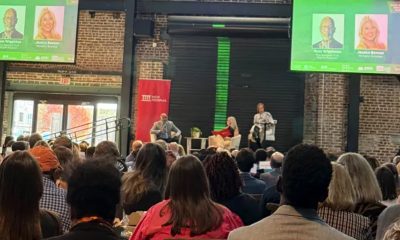#NNPA BlackPress
Prosecutors no longer going after low-level marijuana possession charges
INDIANAPOLIS RECORDER — The Marion County Prosecutor’s Office will no longer prosecute possession of marijuana cases involving one ounce or less of marijuana when the charge is the only or most serious against an adult, interim Prosecutor Ryan Mears announced Sept. 30. The prosecution of possession of marijuana cases has declined recently in Marion County. About 80% of such cases have been dismissed so far this year. In an interview with the Recorder, Mears said it just wasn’t worth anyone’s time to go after these cases.
#NNPA BlackPress
A Nation in Freefall While the Powerful Feast: Trump Calls Affordability a ‘Con Job’
BLACKPRESSUSA NEWSWIRE — There are seasons in this country when the struggle of ordinary Americans is not merely a condition but a kind of weather that settles over everything.
#NNPA BlackPress
The Numbers Behind the Myth of the Hundred Million Dollar Contract
BLACKPRESSUSA NEWSWIRE — Odell Beckham Jr. did not spark controversy on purpose. He sat on The Pivot Podcast and tried to explain the math behind a deal that looks limitless from the outside but shrinks fast once the system takes its cut.
#NNPA BlackPress
FBI Report Warns of Fear, Paralysis, And Political Turmoil Under Director Kash Patel
BLACKPRESSUSA NEWSWIRE — Six months into Kash Patel’s tenure as Director of the Federal Bureau of Investigation, a newly compiled internal report from a national alliance of retired and active-duty FBI agents and analysts delivers a stark warning about what the Bureau has become under his leadership.
-

 Activism4 weeks ago
Activism4 weeks agoDesmond Gumbs — Visionary Founder, Mentor, and Builder of Opportunity
-

 Activism4 weeks ago
Activism4 weeks agoFamilies Across the U.S. Are Facing an ‘Affordability Crisis,’ Says United Way Bay Area
-

 Alameda County4 weeks ago
Alameda County4 weeks agoOakland Council Expands Citywide Security Cameras Despite Major Opposition
-

 Activism4 weeks ago
Activism4 weeks agoBlack Arts Movement Business District Named New Cultural District in California
-

 Alameda County4 weeks ago
Alameda County4 weeks agoBling It On: Holiday Lights Brighten Dark Nights All Around the Bay
-

 Activism4 weeks ago
Activism4 weeks agoLu Lu’s House is Not Just Toying Around with the Community
-

 Activism4 weeks ago
Activism4 weeks agoOakland Post: Week of December 17 – 23, 2025
-

 Activism3 weeks ago
Activism3 weeks agoFirst 5 Alameda County Distributes Over $8 Million in First Wave of Critical Relief Funds for Historically Underpaid Caregivers




















































